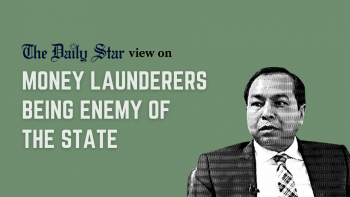Time to be tough on scam-hit NBFIs

Bad loans, the enduring albatross around the neck of our financial sector, are showing no signs of shrinking. In fact, they have been ballooning, burdening an economy that is already facing a host of challenges. As per a new report, defaulted loans at the non-bank financial institutions (NBFIs) accounted for a record 30 percent of all disbursed loans till September last year. Despite the alarming level of anarchy in the sector, it is concerning that the government has not taken adequate measures to hold these institutions accountable.
According to the central bank, soured loans at the country's 35 NBFIs stood at a staggering Tk 21,658 crore, with 10 of the institutions accounting for Tk 14,616 crore or 67.48 percent. Bad loans at the People's Leasing and Financial Services, which faced widespread irregularities and scams, amounted to Tk 1,097 crore or 99.02 percent of its total disbursed loans—which is unthinkable—while it is Tk 3,917 crore or 95 percent for the International Leasing and Financial Services, another scam-hit NBFI. The question is, how have these institutions come to face such a severe predicament?
These defaulted loans may partially be the result of external pressures, including the forex market crisis, but as a former governor of Bangladesh Bank has said, the central bank is largely to blame for this situation. Despite NBFIs being frequently embroiled in scams and loan irregularities, the regulator did not ramp up supervision, letting the sector fall into a crisis. It is worth mentioning that such irregularities are not limited to NBFIs alone; the whole financial sector is reeling from the lack of proper corporate governance and resultant effects. Last month, the Centre for Policy Dialogue (CPD) reported that Tk 92,000 crore has been looted via bank scams over the last 15 years.
Therefore, it is clear that the whole financial sector is in need of reform, one that would uproot corruption. To this end, the central bank has to ensure robust monitoring to keep the sector in check, and non-performing NBFIs must be completely overhauled or shut down, while many may need to be merged, as suggested by an expert. Simultaneously, institutions must carefully screen creditworthy borrowers before disbursing a loan, and continue to monitor them. Ultimately, if good governance is not ensured, these institutions will continue to falter.


 For all latest news, follow The Daily Star's Google News channel.
For all latest news, follow The Daily Star's Google News channel. 









Comments